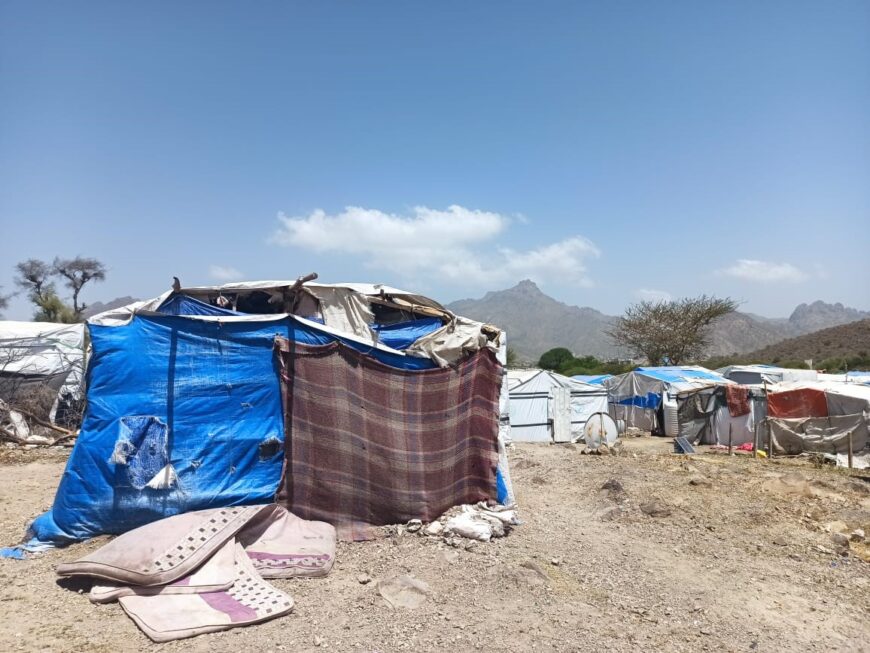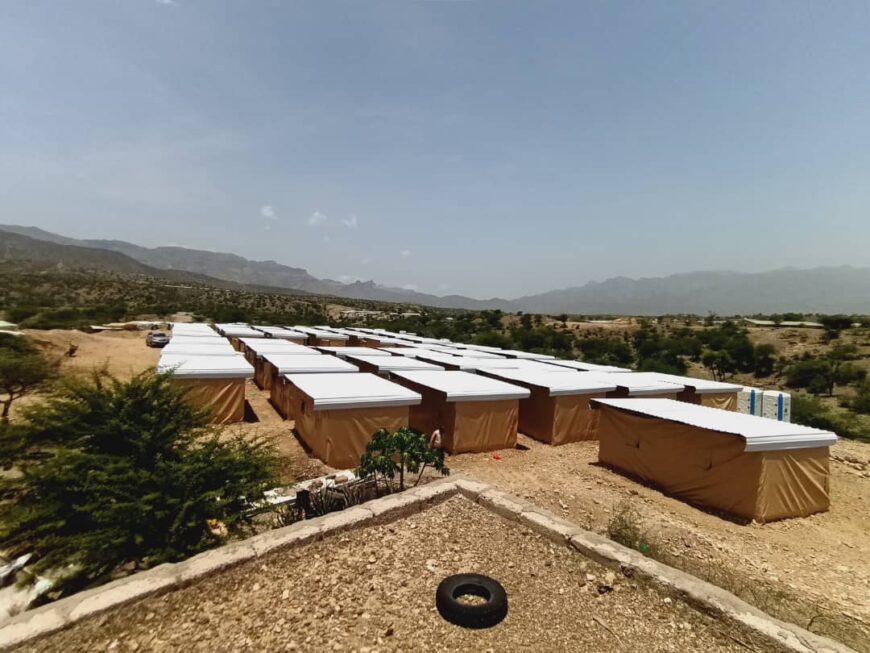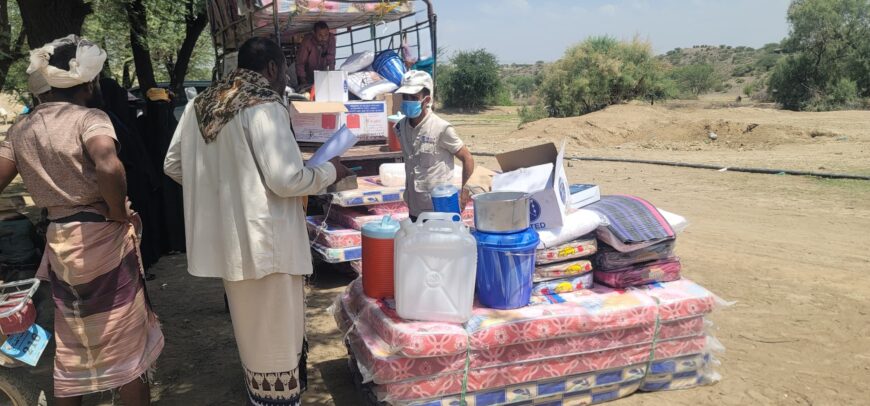Yemen, ongoing conflict and economic crisis have led to repeated displacements, with 14 % of families uprooted multiple times. This has heightened their vulnerability, particularly in overcrowded IDP hosting sites that lack adequate shelter, water, and sanitation. Currently, approximately 6.7 million people require shelter and non-food item (NFI) support - including 40% IDPs and 60% non-IDPs (returnees and host communities) - with about 2.7 million living in catastrophic and extreme shelter conditions. Moreover, 69% of IDPs face overcrowded and unsafe living situations, severely impacting their well-being, safety, and dignity.
Protracted and multiple displacements continue to affect millions due to ongoing conflict in Yemen, with an estimated 4.5 million people – 14 % of the population – currently displaced. Nearly 31 % of these families have experienced multiple displacements, further eroding their coping capacities. Many have sought refuge in overcrowded IDP hosting sites, which often lack adequate shelter, water, sanitation, and hygiene facilities, exposing residents to heightened health and protection risks. In 2023, over 314,000 individuals were newly displaced, primarily due to severe weather events, with around 76 % affected by floods and cyclones. Meanwhile, conflict-related displacement has seen an 83 % decrease compared to previous years.
Despite this positive trend, according to HNO, 86 % of surveyed households cited conflict and violence as the primary reasons for their displacement, compounded by extensive damage to housing and infrastructure, which hampers return efforts.
The protracted situation, exacerbated by climate crises, economic hardship, and increased costs of living, has left many vulnerable and financially unable individuals to address their shelter needs. Of those in need, 85% are unable to pay rent and face the risk of eviction, with 86% of IDPs in spontaneous sites exposed to housing, land, and property (HLP) issues. Furthermore, 69% of IDPs live in overcrowded and unsafe conditions, lacking privacy and essential household items that significantly impact their well-being and dignity.
Households led by women, minors, older individuals, persons with disabilities, and survivors of gender-based violence continue to face precarious living conditions. An assessment indicates that 88% of houses and most basic infrastructure in return areas are either totally or partially destroyed, resulting in 77% of returnees living in inadequate and unsafe environments. Moreover, the harsh climate poses additional challenges; Yemen’s highlands can experience freezing temperatures in winter, impacting vulnerable IDPs. Approximately 10% of those in need of shelter and NFI assistance live in areas at high risk of severe winter weather, while around 7% suffer from extreme heat during summer months.
To address these pressing shelter needs, Acted’s project provided assistance over one year, focusing on both immediate relief and sustainable solutions. With funding from U.S. Agency for International Development – Bureau for Humanitarian Assistance (BHA), Acted has been supporting IDPs living within IDP sites in Al Dhalee governorate by distributing Non-Food Items (NFIs), Emergency Shelter Kits (EESKs) and T-Shelter kits (TSKs).
Enhancing living conditions through EESK and TSK in Al Dhalee governorate
In January and August 2024, Acted conducted the distribution/installation of 220 EESKs to address the urgent shelter needs across 3 sites in Al Dhalee governorate. Through this intervention, Acted reached a total of 1,273 individuals, providing both complete EESKs (including plastic sheeting, ropes and wooden plates), and replacements (e.g., wooden poles, wooden plates, tarpaulin, wooden nails, nylon rope, nails, hammer…) for damaged materials in order to rehabilitate the existing and still usable shelters.
Ahmed Hassan and Ibrahim both faced difficult decisions driven by the escalating conflict in their respective hometowns. Ahmed Hassan, originally from Somalia, had been living in Al Fakher, Qatabah district (Al Dhalee govenorate) for six years. However, as the front line slowly advanced closer to Al Fakher, conditions became increasingly dangerous. A couple of months ago, he made the decision to relocate his family to Al Madhour site. Similarly, Ibrahim, from Maqbana village (Taiz governorate), found himself in a similar situation. Approximately two months ago, as the conflict intensified and the front lines approached his village, he decided to move his family to Al Madhour site to escape the growing danger.
Before Acted’s intervention, the living conditions at Al Madhour site were dire. Many families lived in unsuitable shelters, while others had no shelter at all. Harsh weather conditions further threatened their health and safety, exacerbating the already difficult circumstances.
My family lived in a small makeshift structure that didn’t protect us from rain, cold, or heat.


Ibrahim faced similar hardships. “My family did not have a shelter before, and I couldn’t build a new one for us. We had to stay with our relatives, even though their homes were also in bad condition”. He added,
We faced many challenges over the past two months due to the rainy season and strong winds. We were always preparing for the rain, and when it came, our food and bedding got ruined.
Acted’s intervention improved Ahmed Hassan, Ibrahim and all the other families living conditions through EESK support in Al Madhour sites.
The EESK has provided strong shelters that protect us from rain, cold, heat, and wind, making our living conditions safer and more comfortable. These new shelters also help keep our food supplies safe and improve our overall health. After receiving the new shelter, my family and I now have our own space and can go about our daily lives normally and privately. The high-quality reinforced tarpaulins have been particularly effective in ensuring our safety and well-being.
Acted intervened distributing and assembling 102 TSKs in April and May 2024, across 5 sites, reaching overall 620 individuals. Habeel Al-Dawhagah Camp (Al Dhalee district) located near the frontlines, is one of the most challenging areas for displaced residents. IDPs there endure extremely severe conditions in unsuitable temporary shelters that fail to provide adequate protection against harsh weather conditions and sufficient privacy. Shafiq, 40 years old, who lives with his seven children in one of the tents in Habeel Al-Dawhagah Camp, explains his situation prior to Acted’s intervention:
“My children and I lived in an emergency shelter that was not suitable for living and could not protect us from severe weather conditions such as rain, intense heat, and cold. We used to add cloth covers, like blankets, to protect ourselves from the weather, but that wasn’t sufficient. Unfortunately, the sun and rain quickly wore the shelter down”.
To address IDPs needs in Habeel Al-Dawhagah Camp, Acted established 43 new TSK Shafiq expresses his deep gratitude and appreciation, describing how his life has improved: “Now I live in a safe and stable transitional shelter, where I can enjoy life with my family safely and comfortably. We now have the privacy and dignity that we lacked before. I go about my daily life as usual and go to work knowing that my family is living safely”.
Supporting IDPs in Al Dhalee governorate with NFI kits to strengthen shelter intervention
Additionally, Acted distributed NFI kits across 20 sites in Al Dhalee and Qatabah districts. Overall, Acted’s intervention provided 450 essential NFIs to a total 2,997 individuals across the 19 targeted sites.
Fatima, a 39-year-old woman, lives with her six family members at the Sanah IDP site (Al Dhalee district). Originally from Al Hushaa district (Al Dhalee governorate), she was forced to relocate six years ago when the conflict escalated, bringing the front line dangerously close to her village. To protect her family from the violence, she made the decision to move to the Sanah site, where they have been living since.

Prior to Acted’s intervention, Fatima and her family faced significant hardships. Living in vulnerable conditions in Sanah site after fleeing their village due to escalating conflict, they struggled with a severe lack of essential NFIs. Without basic supplies like cooking utensils, bedding, and blankets, their daily lives and well-being were greatly affected, leaving them without the necessities for a safe and comfortable living environment. Reflecting on their situation, Fatima says: “We were living in a very poor state where I lacked essential items like bedding, blankets, and kitchen utensils. I couldn’t afford to buy these items due to financial difficulties. We were using a nearly torn mattress and very thin blankets that barely protected us from the winter cold”. However, following Acted’s intervention, Fatima’s situation has significantly improved.
The NFIs we received have made a big difference in our daily lives. We now have the basic items we need to cook and sleep comfortably. This support has greatly improved our quality of life and helped us feel more like home
Acted’s intervention has had a profound impact on the lives of displaced families by addressing their urgent shelter needs. The provision of TSKs and EESK has significantly improved safety, health, and living conditions for these vulnerable populations, offering protection from harsh weather and ensuring a more stable and secure environment. Moving forward, the positive changes brought about by these shelters will continue to enhance the well-being of the beneficiaries, enabling them to rebuild their lives with greater resilience and dignity. Acted’s efforts lay a strong foundation for future activities that will further support the recovery and long-term stability of these communities.